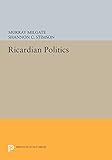Ricardian Politics / Shannon C. Stimson, Murray Milgate.
Material type: TextSeries: Princeton Legacy Library ; 167Publisher: Princeton, NJ : Princeton University Press, [2014]Copyright date: ©1991Edition: Course BookDescription: 1 online resource (184 p.)Content type:
TextSeries: Princeton Legacy Library ; 167Publisher: Princeton, NJ : Princeton University Press, [2014]Copyright date: ©1991Edition: Course BookDescription: 1 online resource (184 p.)Content type: - 9780691603582
- 9781400862443
- 320/.092 23
- online - DeGruyter
- Issued also in print.
| Item type | Current library | Call number | URL | Status | Notes | Barcode | |
|---|---|---|---|---|---|---|---|
 eBook
eBook
|
Biblioteca "Angelicum" Pont. Univ. S.Tommaso d'Aquino Nuvola online | online - DeGruyter (Browse shelf(Opens below)) | Online access | Not for loan (Accesso limitato) | Accesso per gli utenti autorizzati / Access for authorized users | (dgr)9781400862443 |
Frontmatter -- Contents -- Preface -- Note on References -- CHAPTER ΟΝΕ. The Case of Ricardo -- CHAPTER TWO. Representative Government -- CHAPTER THREE. The Reasonable Part of the Country -- CHAPTER FOUR. The Principle of Exclusion -- CHAPTER FIVE. Co-optation and Incorporation -- CHAPTER SIX. The Duration of Parliaments -- CHAPTER SEVEN. Conclusion -- Bibliography -- Index
restricted access online access with authorization star
http://purl.org/coar/access_right/c_16ec
Few deny that the work of economists has often embodied or stimulated significant contributions to political thought. Smith, Keynes, Hayek, and Friedman are good examples. However, the work of the great classical economist David Ricardo is not usually placed in such company. Despite Ricardo's affiliations with philosophical radicals like Bentham and James Mill, the most that previous scholars have been prepared to allow is that if Ricardo spoke to political questions at all, he addressed only economic policy. This book argues forcefully for a revision of that received opinion. Murray Milgate and Shannon Stimson show that Ricardo articulated a distinctive political vision, and that he did so in a novel and sophisticated way by linking arguments for democratic reform with the conclusions of political economy. Ricardian Politics examines compelling but neglected evidence of how Ricardo deployed economic theory to construct a new view of politics. Milgate and Stimson analyze the case he made for a more inclusive political society and for a more representative and democratic government, discuss how his argument was structured by his economics, and explicitly draw out comparisons with Bentham and James Mill. Ricardo wrote at a critical moment, which saw the consolidation of capitalist industry and the emergence of modern democratic political ideology. By attending to the historical context, this book recovers a more accurate picture of his thought, while contributing to the current renewal of research on the relationship between economic and political thought in early nineteenth-century Britain.Originally published in 1991.The Princeton Legacy Library uses the latest print-on-demand technology to again make available previously out-of-print books from the distinguished backlist of Princeton University Press. These editions preserve the original texts of these important books while presenting them in durable paperback and hardcover editions. The goal of the Princeton Legacy Library is to vastly increase access to the rich scholarly heritage found in the thousands of books published by Princeton University Press since its founding in 1905.
Issued also in print.
Mode of access: Internet via World Wide Web.
In English.
Description based on online resource; title from PDF title page (publisher's Web site, viewed 30. Aug 2021)


